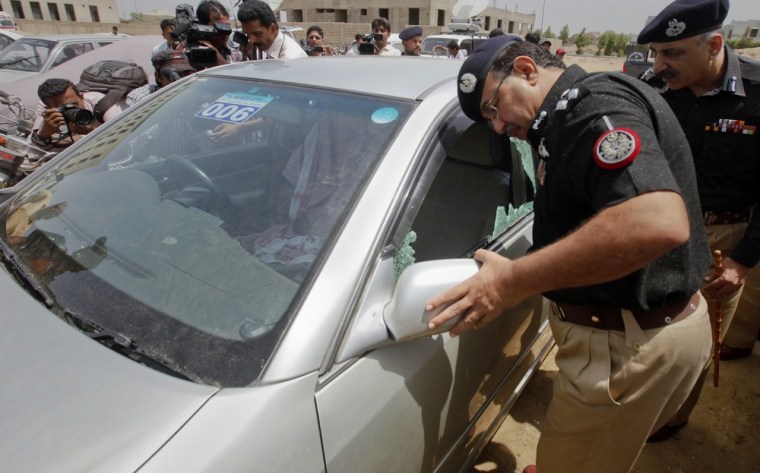Gunmen on a motorbike shot and killed a Saudi diplomat as he was driving in Pakistan's largest city on Monday, just days after two hand grenades were tossed at the Arab state's consulate building, police in Karachi said.
"We take responsibility," a spokesman for Pakistan's al-Qaida-linked Taliban said by telephone from an undisclosed location, referring to the killing of the diplomat earlier in the day.
"Until America stops chasing al-Qaida and stops drone strikes we will keep carrying out such attacks," he said, referring to U.S. attacks with pilotless aircraft on militants in northwest Pakistan.
The attack on the Saudi diplomat comes against a backdrop of tensions between Islam's Sunni and Shiite branches, both in the Middle East and in Pakistan.
Saudi Arabia has funded hardline Sunni groups in Pakistan for years, angering its minority Shiites. Meanwhile, Iran has channeled money to Shiite groups, and in the 1980s and 1990s the country was the scene of an effective proxy war between Iran and Saudi Arabia, with Karachi an especially bloody battleground.
Monday's attack took place not far from the consulate building. The diplomat — who was driving a silver Toyota Corona and was alone — appeared to be on his way to work, said police officer Zameer Husain Abbasi. He said a 9 mm pistol was used in the assault.
Saudi Arabia condemned what it described as a "criminal attack" and said it would investigate alongside Pakistani authorities, the state news agency said.
It identified the diplomat who was killed as consulate staffer Hassan al-Qahtani who was "assassinated while on his way to work," but gave no further details on the attack.
The victim was a member of the security staff at the consulate, said Iqbal Mehmood, Karachi's deputy inspector of police. He said the shooting was carried out by two men on a motorbike and appeared to be linked to last week's grenade attack on the mission, which caused some damage but no injuries.
"We condemn this attack. No one who carries out this kind of attack can be a Muslim," the ambassador, Abdul Aziz al-Ghadeer, told Reuters. He did not give details on the rank of the diplomat who was killed.
Increasing security In the wake of the shooting, a Saudi foreign ministry official said the nation will increase security for its diplomats in countries considered as danger zones, starting in Pakistan.
"We will start with Pakistan, but if security is needed in other countries, we won't hesitate," said the official, who declined to be named. He declined to specify which countries might see heightened security measures.
Karachi is a violent city of 18 million people — a cauldron of ethnic, sectarian and political tensions.
Pakistan's alliance with Sunni rulers in the Middle East has come under the spotlight since the uprisings there this year. A company with strong links to the country's army announced it was sending 1,000 Pakistanis to Sunni-led Bahrain to help its security forces put down an uprising by its majority Shiites, angering Pakistani Shiites.
The attacks on the consulate and its staff also follow the May 2 U.S. raid in northwest Pakistan that killed Osama bin Laden, the Saudi-born chief of the Al-Qaida terrorist network.
The organization is violently opposed to the Saudi government and has vowed revenge for the killing of bin Laden.
Saudi Arabia stripped bin Laden of citizenship and has fought al-Qaida, but money from some of its citizens is believed to help bankroll the terrorist network, which have carried out scores of attacks inside Pakistan over the last 10 years.
"We trust the Pakistani authorities and hope they will identify the terrorists and bring them to justice," al-Ghadeer said.
"The authorities in Karachi are working very hard and we trust them. We are working together. We trust Pakistan will do its best to ensure the terrorists are caught and identified."
